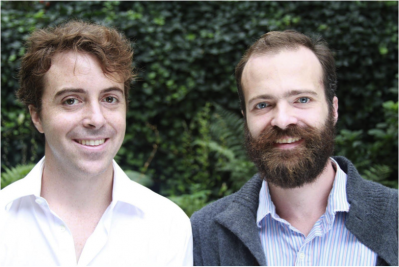Food labeling is a hot topic right now, as anyone privy to the heated debate about California's Prop 37 will know. This pair of clever siblings are ahead of the curve with their company, HowGood, which brings transparency to shoppers in a more sophisticated and relevant way than ever before. Relevant, that is, to the issues that matter to savvy food shoppers, including provenance of ingredients and manufacturing processes. It's our favorite California market, Bi-Rite, that says it best: '[It] isn't about politics. It's about transparency.'
When did you know that you wanted to work in food?
Alexander: We've actually talked about working together in food since we were little kids. Initially we wanted to open a restaurant called A&A's. It never quite came about, but there was always a love of food in the mix. Arthur's 'aha' moment happened in the aisle of a British grocery store, somewhere between the tinned beans and the frozen haggis. Not knowing the foreign brands, and with no understanding of which food products were better than others, he didn't know what was worth buying. Over the phone we started to hash out our idea.
Arthur: But going back before that to explain why I was so out of luck in London, we have to mention our upbringing. We were lucky to grow up with parents who fed us good food and encouraged conversation about where our food was coming from. We spent our childhood in Portugal and upstate New York, so we were spoiled with fresh, local food year-round. I think we just always took for granted that food ought be a certain way, and my experience working in the UK really solidified for me that "well, actually, for most people it's not that way!" After that experience, I knew that this was something I needed to work on.
Alexander: When Arthur and I started discussing this more seriously, it was really a no-brainer for me. Here's a great idea with a lot of potential, it serves a larger social purpose, and it's what people are increasingly demanding!
How did you get your current good food job?
Alexander & Arthur: We invented it! Or rather, to appease the shared collective creativity gods and Maria Popova, we were inspired by a bunch of different experiences and events to create HowGood. We started out in 2006 after that first phone call, and like any good entrepreneurial venture, it was one big science experiment for a while. We tested out several concepts, like having a rating system that was entirely web-based, and even had a different name - SCRYVE. We've been operating as HowGood, installing our rating system in grocery stores around the country for about nine months now. It's been an awesome journey, and we are very lucky to be working together, doing what we love best.
How did your previous work or life experience prepare you for a good food job?
Arthur: I work entirely on the research side, which is perfect for me. I've always loved reading and digging for small truths. Figuring out what goes into making a product, from worker's wages to use of GMOs to ingredient sourcing, is a natural extension of that. We research 60 to 70 industry-specific metrics for each food product, and I get to talk to manufacturers and vets and scientists to establish them. Given my love of cooking and background in consulting, food and data collection were always going to be a potent combination for me.
Alexander: I started a business in college that I ran for several years. The skills I amassed during that time have proved invaluable throughout this venture. A lot of what we do is business, plain and simple, and knowing how to deal with finances, investors, managing employees and sales is really important. Getting supermarkets and food producers to change the way they sell and manufacture food isn't easy, and we have to work on their level.
What was the greatest obstacle you had to overcome in pursuing your Good Food Job dream?
Arthur: We haven't had too many real obstacles. Lot's of little logistical ones have attempted to get in the way. Finances, the industry not existing, you name it, but we were comfortable that those were temporary. We never really had to consider quitting, either. We started out with a rule that if either of us stopped enjoying it, we'd quit, and we never got there. Enjoying both our work and our lives ensured that even when earning a living was difficult, the work still felt worth it.
What can you identify as the greatest opportunities in food right now?
Alexander: We're not just saying this because we work in it - all you have to do is look at Mark Bittman's recent article to see we've got some backing- but a consumer-facing sustainable rating system is the next big thing. Plenty of companies and stores employ back-end ratings that let them decide what they, for personal, economic or other reasons, think is 'good' food. But there's nothing that lets the customer make the final decision, and ultimately, it's the customer that is paying for that food and feeding it to their family.
If you could be compensated for your work with something other than money, what would it be?
Arthur: Cheeses and meats, and also large slabs of raw material.
Alexander: And I would be happy going over to eat (on) them.









